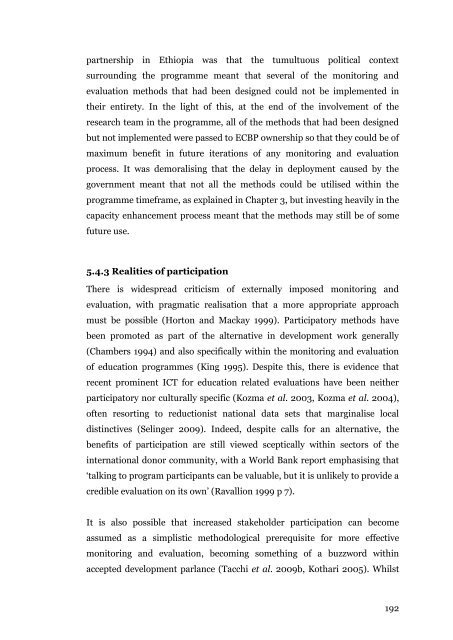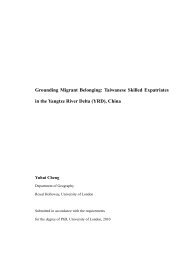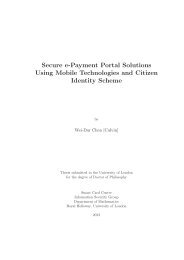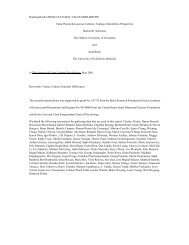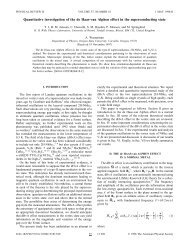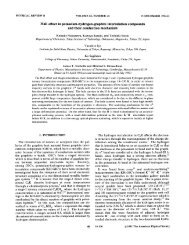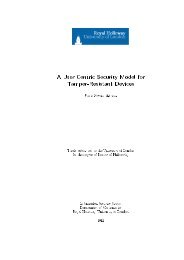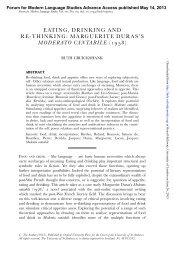- Page 4 and 5:
the research findings to emphasise
- Page 7 and 8:
3.4.5 Drawings ....................
- Page 9 and 10:
5.4.1 Plurality of methods ........
- Page 11 and 12:
8.3 Implications of aspiration ....
- Page 13 and 14:
List of figuresFigure 2.1: MDGs (UN
- Page 15 and 16:
List of appendicesAppendix A: Resul
- Page 17 and 18:
NOLNet Namibian Open Learning Netwo
- Page 19 and 20:
I began this PhD two weeks after mo
- Page 21 and 22:
number of ICT for education program
- Page 23 and 24:
innovative alternatives, and the ce
- Page 25 and 26:
2.2 Substance, rationale and approa
- Page 27 and 28:
progress towards the EFA goals has
- Page 29 and 30:
The critique posed to the market th
- Page 31 and 32:
etween these two extremes as a resu
- Page 33 and 34:
promoted to become „the character
- Page 35 and 36:
appropriate application in recognit
- Page 37 and 38:
can instigate both harm and good, i
- Page 39 and 40:
Such an undertaking is central to t
- Page 41 and 42:
- Availability of computer networks
- Page 43 and 44:
assisting towards this end. The imp
- Page 45 and 46:
eing rooted in specific socio-cultu
- Page 47 and 48:
evaluation: „An evaluation carrie
- Page 49 and 50:
Central within this is recognising
- Page 51 and 52:
2.6.2 Maturing of the disciplineEar
- Page 53 and 54:
that conceptualises ICT for develop
- Page 55 and 56:
2006). This also requires the adopt
- Page 57 and 58:
attempt to impose overarching solut
- Page 59 and 60:
currently the lowest available „p
- Page 61 and 62:
Garcia-Montes et al. 2006). This is
- Page 63 and 64:
However, despite such claims and th
- Page 65 and 66:
into knowledge and applied in life
- Page 67 and 68:
dependent upon an increased emphasi
- Page 69 and 70:
that ICT is having on education in
- Page 71 and 72:
3. Methodology3.1 IntroductionThe p
- Page 73 and 74:
2004) and instead focused on utilis
- Page 75 and 76:
evaluation of ICT and development p
- Page 77 and 78:
ICT for development programmes (Hee
- Page 79 and 80:
organisations, explanation of the p
- Page 81 and 82:
3.3.1 EuroTalk LtdEuroTalk (http://
- Page 83 and 84:
further two weeks in Ethiopia in De
- Page 85 and 86:
I was invited by InWEnt to particip
- Page 87 and 88:
planning and implementation they co
- Page 89 and 90:
the one on the adjacent line. This
- Page 91 and 92:
drawings was as a precursor to anci
- Page 93 and 94:
Photo 3.3: Students completing the
- Page 95 and 96:
prior to implementation of the prog
- Page 97 and 98:
provided regular opportunity for se
- Page 99 and 100:
for education in Africa from a list
- Page 101 and 102:
conversations with respondents, as
- Page 103 and 104:
partially based on the flawed notio
- Page 105 and 106:
in the research then all those unab
- Page 107 and 108:
motivational and aspirational techn
- Page 109 and 110:
In the light of the complex challen
- Page 111 and 112:
It cannot be guaranteed that resear
- Page 113 and 114:
Embrace the heterogeneity of commun
- Page 115 and 116:
The majority of the research encoun
- Page 117 and 118:
which each received 20 devices for
- Page 119 and 120:
Figure 4.1: ICT for development pol
- Page 121 and 122:
Photo 4.1: Students exploring the I
- Page 123 and 124:
and engaged with children, teachers
- Page 125 and 126:
the programme with all of them havi
- Page 127 and 128:
widespread lack of textbooks and in
- Page 129 and 130:
esources but also that it serves to
- Page 131 and 132:
in order to reflect the involvement
- Page 133 and 134:
Photo 4.4: Students in Ethiopia exp
- Page 135 and 136:
on the donation of solar panels fro
- Page 137 and 138:
Photo 4.6: Teacher training in Rema
- Page 139 and 140:
4.3.10 Programme futureThe XO 5000
- Page 141 and 142: 4.4.3 The importance of ICT for edu
- Page 143 and 144: theme focussed on the lack of budge
- Page 145 and 146: esponses, three dominant themes eme
- Page 147 and 148: The experience of interacting with
- Page 149 and 150: „In the institutions we have work
- Page 151 and 152: Access to a wide variety of resourc
- Page 153 and 154: assessment that emphasised the tran
- Page 155 and 156: have been mitigated had the project
- Page 157 and 158: and the need for sustained probing.
- Page 159 and 160: Descriptionof methodFocus groupsLoc
- Page 161 and 162: Classroomobservations24 in Malawi a
- Page 163 and 164: 5.3.1 Baseline testingDiscussion at
- Page 165 and 166: indicated that although apparently
- Page 167 and 168: The lack of evidence from the basel
- Page 169 and 170: Choose the correct answer and write
- Page 171 and 172: eflection upon the format suitabili
- Page 173 and 174: you can follow that. It gives you g
- Page 175 and 176: Following the final iteration of gr
- Page 177 and 178: the method within its appropriate c
- Page 179 and 180: more innovative approach to catalys
- Page 181 and 182: to identify significant themes that
- Page 183 and 184: „Everything that the teachers wro
- Page 185 and 186: (Shurmer-Smith 2002, Herbert 2000).
- Page 187 and 188: 5.4 Lessons for effective operation
- Page 189 and 190: and be provided with research assis
- Page 191: problematic problem but it is the o
- Page 195 and 196: teachers maintaining many external
- Page 197 and 198: weekend then they will be there and
- Page 199 and 200: coffee and dancing together in a ro
- Page 201 and 202: emphases can serve to reinforce eac
- Page 203 and 204: eferring back to previous experienc
- Page 205 and 206: Tilahun reflected on the reasons be
- Page 207 and 208: The limited emphasis on quantifying
- Page 209 and 210: 5.5 Implications for capacity devel
- Page 211 and 212: improve and build capacity. Similar
- Page 213 and 214: These issues allude to the bigger p
- Page 215 and 216: esponses to questions regarding par
- Page 217 and 218: Month Activity Challenges Strengths
- Page 219 and 220: communicate alternative withappropr
- Page 221 and 222: EuroTalk are keen for thefindings t
- Page 223 and 224: 6.2 Why partnership?The contributor
- Page 225 and 226: (Unwin 2005b). The notion of tri-se
- Page 227 and 228: assess the efficacy of the partners
- Page 229 and 230: 6.3.1 Contrasting bottom linesPartn
- Page 231 and 232: to engage with the development pote
- Page 233 and 234: that could be distributed specifica
- Page 235 and 236: sector was the most significant cha
- Page 237 and 238: My suggestion that I might speak wi
- Page 239 and 240: approach is found in assessing the
- Page 241 and 242: the fieldwork. The effect of the ob
- Page 243 and 244:
(13/04/08). Although prevented from
- Page 245 and 246:
„We should have worked more close
- Page 247 and 248:
since the language being used faile
- Page 249 and 250:
demonstrated in an interview with E
- Page 251 and 252:
discussions and various unsuccessfu
- Page 253 and 254:
of partnership (Marriot and Goyder
- Page 255 and 256:
„‟When we think of monitoring s
- Page 257 and 258:
the impact on ECBP from spending ti
- Page 259 and 260:
„It has to do with the history of
- Page 261 and 262:
6.7.2 Potential to redefine practic
- Page 263 and 264:
monitoring and evaluation can provi
- Page 265 and 266:
Photo 7.2: Desks and benches in cla
- Page 267 and 268:
quantifying educational outputs. It
- Page 269 and 270:
of technology within education in A
- Page 271 and 272:
pedagogies, and new approaches to t
- Page 273 and 274:
eLearning in Africa. Training was h
- Page 275 and 276:
Second, alongside the enthusiasm ma
- Page 277 and 278:
in Ethiopia meant that the monitori
- Page 279 and 280:
„Akili has big potential - becaus
- Page 281 and 282:
„The main problem we are facing i
- Page 283 and 284:
colonial approach‟ (09/12/08) to
- Page 285 and 286:
The aim of providing free and unive
- Page 287 and 288:
Photo 7.4: Lessons in Malawi conduc
- Page 289 and 290:
Photo 7.5: Girls in Rema herding go
- Page 291 and 292:
teachers working in primary schools
- Page 293 and 294:
Teachers in Rema (22/04/08) gave a
- Page 295 and 296:
disaster. The contrasting potential
- Page 297 and 298:
2006). This is demonstrated by the
- Page 299 and 300:
Indeed, between these two extremes
- Page 301 and 302:
„I use the laptop a lot at home f
- Page 303 and 304:
Critical thinking constitutes a sig
- Page 305 and 306:
misconception regarding the nature
- Page 307 and 308:
Bloom’s Original Taxonomy(1956)An
- Page 309 and 310:
associated negative consequences to
- Page 311 and 312:
adherence to a flawed promotion of
- Page 313 and 314:
„We are not interested with the t
- Page 315 and 316:
failing to complete primary educati
- Page 317 and 318:
has received some attention (Naraya
- Page 319 and 320:
The traditional dominant narrative
- Page 321 and 322:
Children reported that they felt mo
- Page 323 and 324:
from Golgota eagerly affirmed this,
- Page 325 and 326:
and 2 compared to Standard 3 and 4.
- Page 327 and 328:
two case studies from Ethiopia. It
- Page 329 and 330:
as a good way to communicate with p
- Page 331 and 332:
increasingly apparent that Rema was
- Page 333 and 334:
evaluation and sustained an overly
- Page 335 and 336:
symbol of something good that Malaw
- Page 337 and 338:
aspiration could be viewed as poten
- Page 339 and 340:
journalist whose article was publis
- Page 341 and 342:
and powerful if we have OLPC here i
- Page 343 and 344:
If every child in Ethiopia who is e
- Page 345 and 346:
population live on less than $2 per
- Page 347 and 348:
However, as is now explored, the ve
- Page 349 and 350:
the right to profit from sale of al
- Page 351 and 352:
8.5.2 Private sector needs creation
- Page 353 and 354:
merely another context within which
- Page 355 and 356:
Commodity fetishism through aspirat
- Page 357 and 358:
The absurdity of the situation was
- Page 359 and 360:
„As we are a part of globalizatio
- Page 361 and 362:
of aspiration. Engaging effectively
- Page 363 and 364:
(Ellul 1964) does delegitimize uncr
- Page 365 and 366:
motivations for partnership. The im
- Page 367 and 368:
educational challenges and opportun
- Page 369 and 370:
choice of theoretical foundation, w
- Page 371 and 372:
It is therefore my hope that the me
- Page 373 and 374:
9.2.5 Ongoing potential for transfo
- Page 375 and 376:
undoubtedly become more so in the f
- Page 377 and 378:
esearch undertaken for this thesis.
- Page 379 and 380:
9.5 Education: a final wordThe thes
- Page 381 and 382:
BibliographyAAG, 2009. Statement of
- Page 383 and 384:
Batchelor, S., Evangelista, S., Hea
- Page 385 and 386:
Development Department Education Gr
- Page 387 and 388:
learning: a sourcebook for evaluato
- Page 389 and 390:
evaluation in education. Studies in
- Page 391 and 392:
DFID, 2008. Private sector developm
- Page 393 and 394:
EFA, 2001. Dakar framework for acti
- Page 395 and 396:
Fadel, C. and Lemke, L. 2006. Techn
- Page 397 and 398:
G8, 2007. Growth and responsibility
- Page 399 and 400:
Greene, J., 2005. Mixed methods. In
- Page 401 and 402:
Harrow, J., 2001. Capacity building
- Page 403 and 404:
Hine, C., 2005. Virtual methods and
- Page 405 and 406:
Illich, I., 1969. Celebration of aw
- Page 407 and 408:
Oliver, G., (ed) 2005. Maitland+20:
- Page 409 and 410:
Lasonen, J., Kemppainen, R., and Ra
- Page 411 and 412:
Mansell, R., 2005. The fragility of
- Page 413 and 414:
Mercer, C., 2006. Telecentres and t
- Page 415 and 416:
Mutume. G., 2006. Harnessing the in
- Page 417 and 418:
Olukoshi, A., 2006. African scholar
- Page 419 and 420:
Paul, R. and Elder, L. 2005. The mi
- Page 421 and 422:
Roy, S., 2005. Globalisation, ICT a
- Page 423 and 424:
Shadish, W, Cook, T. and Campbell D
- Page 425 and 426:
Sperling, G., 2008. A global educat
- Page 427 and 428:
Thomas, J, 1996. Introduction: a de
- Page 429 and 430:
UNESCO, 2006a. Teachers and educati
- Page 431 and 432:
Unwin, T., 2009a. Conclusions. In U
- Page 433 and 434:
Walker, J, 2005. Self-determination
- Page 435 and 436:
Winch, C., 2005. Autonomy as an edu
- Page 437 and 438:
Appendices437
- Page 439 and 440:
439
- Page 441 and 442:
441
- Page 443 and 444:
Interviewee Company Details of Resp
- Page 445 and 446:
UK LtdJohn Connell Cisco Brief resp
- Page 447 and 448:
Appendix C: Sample of Malawi indivi
- Page 449 and 450:
Tell me, when you see a school like
- Page 451 and 452:
Appendix D: Sample of Ethiopia stud
- Page 453 and 454:
classes‟.For final question promp
- Page 455 and 456:
Children InformationInformation fro
- Page 457 and 458:
Appendix F: Sample of Malawi focus
- Page 459 and 460:
Appendix G: Sample of Ethiopia teac
- Page 461 and 462:
esponsibility of being apilot schoo
- Page 463 and 464:
laptop make to the livesof the chil
- Page 465 and 466:
How have you found thisdiscussion?O
- Page 467 and 468:
demonstrate, the eight questions an
- Page 469 and 470:
the technology solution and initiat
- Page 471 and 472:
made that rule. At the weekend I pl
- Page 473 and 474:
When you are writing the diary plea
- Page 475 and 476:
Do you think the laptops and Akili
- Page 477 and 478:
done?..............................
- Page 479 and 480:
...................................
- Page 481 and 482:
Appendix M: Baseline test in Malawi
- Page 483 and 484:
HIV?a. Yesb. No5. Are there medicin
- Page 485 and 486:
It is important that the test is co
- Page 487 and 488:
Teachers can teach students how to
- Page 489 and 490:
Maths1. What is the LCM of 5, 10 an
- Page 491 and 492:
HealthPlease explain how you can co
- Page 493 and 494:
- Please explain why you think thes
- Page 495 and 496:
495
- Page 497 and 498:
In wanting to do the best evaluatio
- Page 499 and 500:
Baselines (inc. retrospective const
- Page 501 and 502:
Appendix Q: Report from eLA worksho
- Page 503 and 504:
Incorporating more qualitative meth
- Page 505 and 506:
Breakout workshop 3 - DonorsProblem
- Page 507 and 508:
It is difficult to ensure the objec
- Page 509 and 510:
appease donors and secure future fu
- Page 511 and 512:
to demonstrate thatsomething works
- Page 513 and 514:
Insights regarding effective evalua
- Page 515 and 516:
Appendix S: Data table from Malawi
- Page 517 and 518:
A 10% increase in correct answers r
- Page 519:
with headgain overall perspective o


